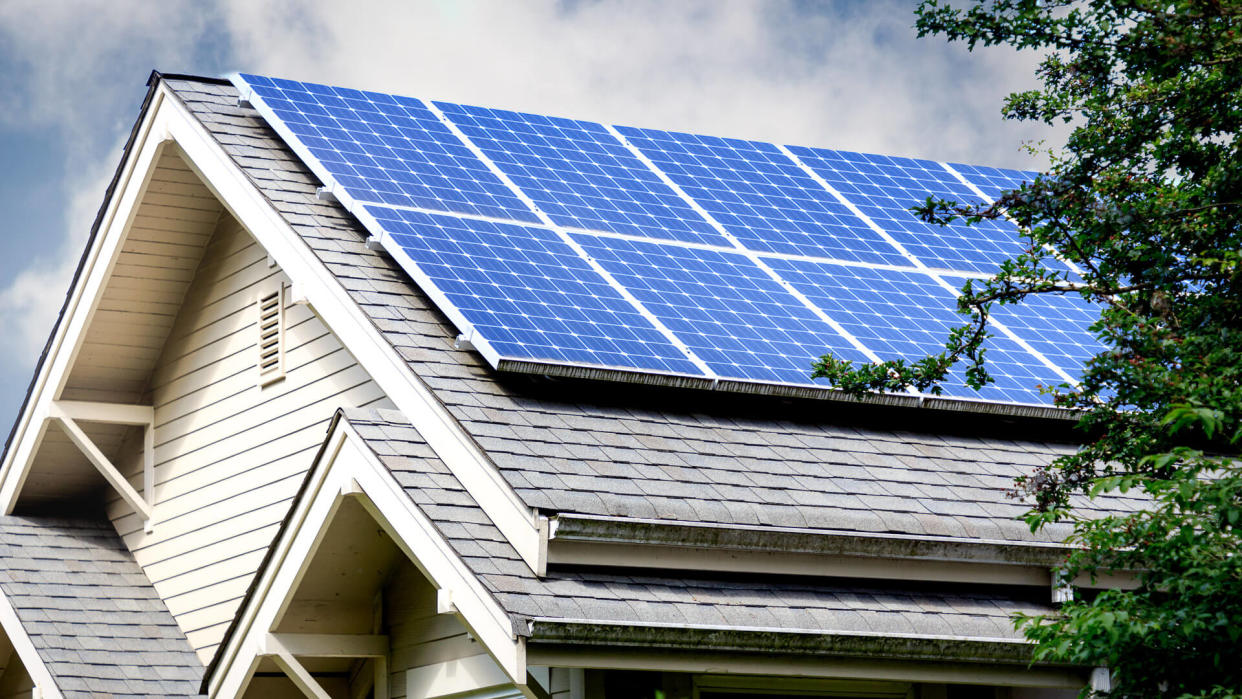Are Solar Panels Worth the Cost?

Solar panel prices can start as low as $5,000 for basic installations and move up toward $40,000 for comprehensive projects. On average, though, people usually pay around $20,020, give or take a few thousand dollars.
Read: This Credit Score Mistake Could Be Costing Millions Of Americans
That might be more than expected, but there are cost savings for consumers too. On top of the “free” energy, there are also federal tax credits available for solar panels.
How Long Do Solar Panels Last?
According to EnergySage, the majority of solar panels will last at least 25 years — even as much as 30 years if they’re kept in good condition. When factoring in the advancements in technology, they can possibly last even longer.
Energy output decreases over time — about 0.8% per year — but older solar panels will still generate electricity, just less. Although it may be common sense, regular cleaning and maintenance can help ensure longevity with solar panels.
What Is the Federal Tax Credit for Solar Panels in 2022?
From 2022 to 2032, U.S. taxpayers can take advantage of a 30% tax credit on solar photovoltaic installations. Anyone who has installed a solar PV system between 2017 and 2034 can apply for a tax credit.
The tax credit can be used against labor costs, such as installation and inspection as well as sales tax and certain equipment. Energy storage devices generating more than 3 kilowatt-hours are also covered.
Solar Panel Prices With Federal Tax Credit Benefit
Here’s a rough idea of how much a solar installation will cost in 2022 once federal tax credits are deducted:
Solar Panel Tier | Initial Cost | Price With the 30% Federal Tax Credit Applied |
|---|---|---|
Low End | $5,000 | $3,500 |
Average | $20,020 | $14,014 |
High End | $40,000 | $28,000 |
Which States Have the Cheapest Solar Panels?
The price of starter solar panels — or any type, for that matter — can vary significantly depending on the area of residence. As the average cost per watt of energy depends on the state, some areas will be more positively affected than others.
As noted in the solar initiatives of the U.S. government’s trillion-dollar infrastructure bill, cost savings of 20% can be attained in several states, including Illinois, New Jersey, New York and New Mexico. For Washington, D.C. and Colorado, 50% savings are expected.
Is Getting Solar Panels Worth It?
To find out the true cost savings, solar panel calculators are advisable. By inputting current energy usage found on recent bills and the typical number of solar hours for a region, it’s easier to understand the costs and savings around solar panels.
For example, California, New Mexico and Arizona will get more solar hours and be more energy efficient as a result. States like Alaska or those in the Northeast such as New York and Michigan get fewer solar hours. Hence, their cost savings tend to be more limited.
How Long Does It Take for Solar Panels To Pay Off?
So, how long does it take for solar panels to pay off? Again, it depends on energy prices in each state, how much electricity is used in a household and whether a solar loan is used.
Some states, like Hawaii and Massachusetts, take as little as five years to be fully paid off. In other cases, such as Louisiana and North Dakota, it could be as much as 16 years. All in all, average estimates fall between 9 and 12 years for the length of time it takes to pay off solar panels.
What Are the Benefits of Getting Solar Panels?
Long-term cost savings are the primary benefit of solar panels, and they may be the most important factor when one is taking the leap. But solar panels have several other advantages, including helping the environment and increasing a home’s value.
Cost Savings From Solar Panels
Solar panels can generate 100% of a home’s electricity needs in some circumstances and can cut normal costs by 75%. With average electricity bills ranging from $100 to $200, the savings add up once the initial solar project hits its breakeven point.
Environmental Benefits From Solar Panels
Being powered naturally by the sun, solar energy is renewable. Solar panels help every individual contribute to a smaller carbon footprint.
A push by more consumers toward solar panels will lead to fewer fossil fuels being burned, which helps reduce air pollution and carbon emissions.
Solar Panels Can Increase the Value of Your Home
Data from a 2019 study conducted by Zillow suggested that solar panels can increase the value of a home by 4%. One-fourth of respondents in a U.K. survey said they were “very likely” to purchase a home with solar panels.
Where Can I Get Solar Panels?
There are several renewable energy companies that sell and install solar panels in the U.S. Some of the top options to choose from include:
Sunrun
Sunpower
Sungevity
Final Take
Solar panels are a good investment for consumers who want long-term cost savings on their electricity bills. However, there is a stiff up-front cost. Nonetheless, when tax incentives and home valuations are taken into account, solar panels are worthwhile for those sitting on an extra stash of cash.
Information is accurate as of Oct. 7, 2022.
This article originally appeared on GOBankingRates.com: Are Solar Panels Worth the Cost?
